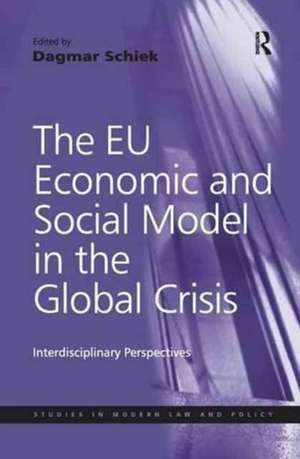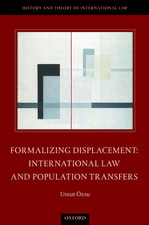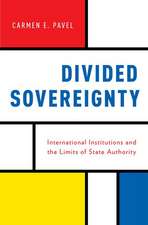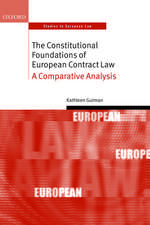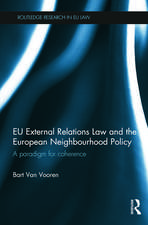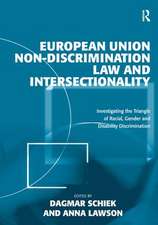The EU Economic and Social Model in the Global Crisis: Interdisciplinary Perspectives
Autor Dagmar Schieken Limba Engleză Paperback – 17 noi 2016
| Toate formatele și edițiile | Preț | Express |
|---|---|---|
| Paperback (1) | 323.23 lei 43-57 zile | |
| Taylor & Francis – 17 noi 2016 | 323.23 lei 43-57 zile | |
| Hardback (1) | 702.19 lei 43-57 zile | |
| Taylor & Francis – 18 dec 2013 | 702.19 lei 43-57 zile |
Preț: 323.23 lei
Nou
Puncte Express: 485
Preț estimativ în valută:
61.85€ • 64.75$ • 51.18£
61.85€ • 64.75$ • 51.18£
Carte tipărită la comandă
Livrare economică 07-21 aprilie
Preluare comenzi: 021 569.72.76
Specificații
ISBN-13: 9781138271913
ISBN-10: 1138271918
Pagini: 224
Dimensiuni: 156 x 234 x 18 mm
Greutate: 0.45 kg
Ediția:1
Editura: Taylor & Francis
Colecția Routledge
Locul publicării:Oxford, United Kingdom
ISBN-10: 1138271918
Pagini: 224
Dimensiuni: 156 x 234 x 18 mm
Greutate: 0.45 kg
Ediția:1
Editura: Taylor & Francis
Colecția Routledge
Locul publicării:Oxford, United Kingdom
Notă biografică
Professor Dagmar Schiek is Jean Monnet ad personam Chair (EU Law & Policy), School of Law, Queen’s University Belfast, UK. She has been a visiting professor and guest lecturer at various universities, including London School of Economics and Maastricht University. Her research interests lie in the field of European Economic and Social constitutionalism, new forms of governance in the EU involving civil society and European and international equality law. Her recent book publications include European Economic and Social Constitutionalism after the Treaty of Lisbon (Schiek, Liebert & Schneider eds, Cambridge University Press October 2011) and Economic and Social Integration: The Challenge for EU Constitutional Law, (Schiek, Cheltenham: Edward Elgar 2012). She is a member of the IUS COMMUNE research school (founded by the Universities of Utrecht, Leiden, Amsterdam, Maastricht and Rotterdam) and on the editorial board of the Maastricht Journal for Comparative and European Law and of Kritische Justiz (Critical Legal Studies, Germany).
Recenzii
’The global economic crisis and the Euro crisis have shattered the foundations of the EU. The contributions in this book seek ways out of the economic bias which is inbuilt into the Treaties, so as to re-invigorate the often debated but still neglected social model of the EU. A must read.’ Hans Micklitz, European University Institute, Italy ’This book is a thorough and competent analysis of the multi-faceted set of crises currently facing Europe and will be valuable to anyone interested in understanding the EU. It provides an excellent insight into the underlying ideologies, important trends, central concepts and main challenges facing the EU and explores the Economic and Monetary Union from an interdisciplinary perspective.’ Ulla Neergaard, University of Copenhagen, Denmark
Cuprins
Chapter 1 The EU's Socio-economic Model(s) and the Crisi(e)s '“ any Perspectives?, Dagmar Schiek; Chapter 2 The Dysfunctional Nature of the Economic and Monetary Union, Philip Arestis, Giuseppe Fontana, Malcolm Sawyer; Chapter 3 The European Currency in Turbulent Times '“ Austerity Policy Made in Brussels the Only Way Out?, Amy Verdun; Chapter 4 The Contested Scope of Labour Law Requirements in Public Procurement '“ a Multi-Level Analysis, Julia Vinterskog; Chapter 5 From Safety Nets and Carrots to Trampolines and Sticks: National Use of the EU as both Menace and Model to Help Neoliberalize Welfare Policy, Charlotte O'Brien; Chapter 6 Empowering Consumer-Citizens: Changing Rights or Merely Discourse?, Katalin Cseres, Annette Schrauwen; Chapter 7 The Politics of Inclusion: Comparing the Contribution of Civil Society Actors to EU Legitimacy, Petra Guasti; Chapter 8 EU Internal and External Social Policy in Times of Global Crisis, Rebecca Zahn; Chapter 9 The EU as a 'Virtuous International Actor': Human Rights Indicators and Global Governmentality, Bal Sokhi-Bulley;
Descriere
This book addresses the viability of the EU economic and social model within and after the global economic crisis. It identifies four key issues which warrant further discussion: the asymmetry of the legal and policy framework of the euro and potential recalibration; substantive tensions between the EU ’economic constitution’ and its normative aim of social justice and impacts on national policy; the role of civil society, including the two sides of industry in overcoming these tensions; and the EU’s global aspirations towards the creation of a viable socio-economic model. Its chapters offer two perspectives on each of the four main issues.
